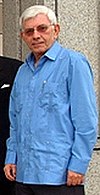Belizean general election, 2003
|
|
|||||||||||||||||||||||||||||||||||||
|---|---|---|---|---|---|---|---|---|---|---|---|---|---|---|---|---|---|---|---|---|---|---|---|---|---|---|---|---|---|---|---|---|---|---|---|---|---|
|
|||||||||||||||||||||||||||||||||||||
|
All 29 seats in the Belize House of Representatives |
|||||||||||||||||||||||||||||||||||||
|
|||||||||||||||||||||||||||||||||||||
|
|||||||||||||||||||||||||||||||||||||
A legislative election was held in Belize on 5 March 2003. Belizeans elected 29 members to the House of Representatives for a term of five years.
The ruling People's United Party (PUP) won the largest share (22) of seats in the election.
The PUP were seeking a second consecutive term in office after recording significant development in the economy from 1998 to 2003. Their opponents, the UDP, sought to replace them in office because of charges of corruption and mismanagement of public funds. Previous to this election, the parties had alternated their time in office since independence.
As an aside, municipal elections had originally been called for this date, creating a situation of triple elections in one day, a first for the Caribbean region according to Myrtle Palacio of the EBD.
As a postscript, Cayo South winner Agripino Cawich Sr. died of illness in August 2003. UDP candidate John Saldivar, who had lost to Cawich in March, won the subsequent by-election over son Joaquin Cawich in October.
This general election was also the first in Belizean history in which former Prime Minister George Cadle Price was not a candidate. Price, who stood down from the Pickstock constituency, had contested every prior general election since 1954, winning each time except 1984.
After what Prime Minister Said Musa called a "drawn-out" campaign that he said affected the country's ability to function, Musa called a house meeting on January 24, 2003 and formally announced that he had asked Governor General Sir Colville Young to dissolve the National Assembly of Belize by February 4, decree nomination of candidates for elections on February 17, and call elections on March 5.
...
Wikipedia


